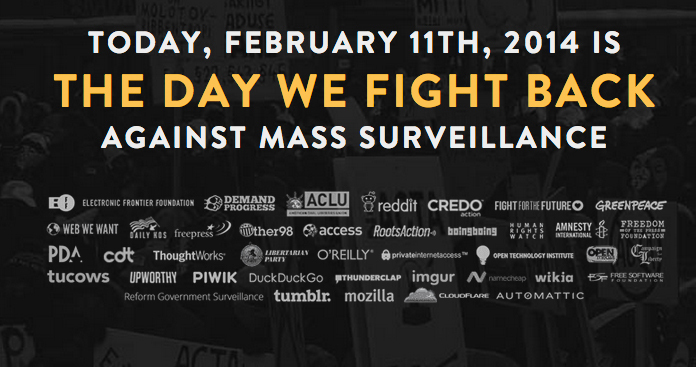Google, Rest of Internet Urge Congress To Change NSA Surveillance Laws
 A large coalition of internet companies and advocacy groups has declared today “The Day We Fight Back” against mass surveillance. The coalition is urging US citizens to contact their legislators to ask for Congressional intervention on mass surveillance programs.
A large coalition of internet companies and advocacy groups has declared today “The Day We Fight Back” against mass surveillance. The coalition is urging US citizens to contact their legislators to ask for Congressional intervention on mass surveillance programs.
Sites around the web are asking readers to call Congress to ask legislators to pass the USA FREEDOM Act (full name: the Uniting and Strengthening America by Fulfilling Rights and Ending Eavesdropping, Dragnet-collection, and Online Monitoring Act) that would overhaul the laws around domestic surveillance and data collection, and to vote against the FISA Improvements Act of 2013, which would create fewer, smaller changes.
Google is echoing the message. On the Google public policy blog, they write, “We strongly believe that government surveillance programs should operate under a legal framework that is rule-bound, narrowly tailored, transparent, and subject to oversight.”
The bills (HR 3361 and S 1599) would amend the Foreign Intelligence Surveillance Act (FISA) and the Patriot Act requirements for surveillance and would create new restrictions and authorization processes around bulk data collection. The full summary includes the lengthy list of proposed changes, but notably the bills propose to:
- End bulk phone data collection
- Require a court order to search for communications data not collected under individual search warrants
- Reform the FISA court
- Require public reporting about FISA implementation
Google also adds that in addition to the USA FREEDOM Act, they would like to see Congress update the Electronic Communications Privacy Act (ECPA), to “require governmental entities to obtain a warrant before they can compel online companies to disclose the content of users’ communications.”
The reach and overreach of the NSA’s surveillance programs have been a major point of controversy since 2013, when now-infamous former contractor Edward Snowden leaked documents about the NSA’s actions to the press. The mass collection of phone data has since been found both legal and also probably unconstitutional, and a presidential advisory team has urged the Obama Administration to halt the program.
Want more consumer news? Visit our parent organization, Consumer Reports, for the latest on scams, recalls, and other consumer issues.

